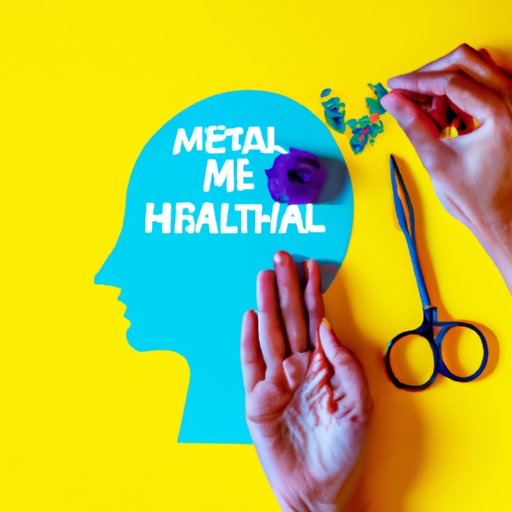
I. Introduction
When it comes to leading a happy and healthy life, the importance of taking care of our mental and physical health cannot be overstated. Our mental health affects our physical health, and vice versa. In this article, we will explore the connection between mental health and physical health, and how we can break down the stigma surrounding mental health to improve our overall wellness.
II. The Mind-Body Connection: Understanding the Impact of Mental Health on Physical Health
Research has shown that there is a powerful connection between mental health and physical health. Poor mental health can lead to a decline in physical health, while poor physical health can harm our mental health. For example, depression and anxiety can compromise our body’s immune system and increase the risk of developing chronic diseases such as heart disease, diabetes, and cancer.
Several scientific research examples illustrate the connection between mental and physical health. For instance, studies show that exercise can help alleviate symptoms of depression and anxiety. Other research suggests that people who experience significant stress or trauma during childhood are more likely to experience a range of physical health problems in adulthood.
Case studies have also shown how poor mental health can lead to physical health conditions. For example, research has linked chronic stress to heart disease, while depression has been associated with an increased risk of stroke and heart attack.
III. Breaking the Stigma: How Seeking Help for Mental Health Can Improve Your Physical Health
The stigma surrounding mental health prevents many individuals from seeking help. However, seeking help for mental health issues is essential to improving overall health and well-being. The mental health community offers a variety of tools and resources, such as therapy, medication, and support groups, to meet diverse needs and promote healing.
While seeking help for mental health can directly improve one’s mental health, it can also contribute to improved physical health outcomes. For instance, addressing anxiety through therapy can reduce symptoms of high blood pressure and heart disease. Generally feeling healthier and happier can lead to better lifestyle choices such as being able to focus on healthy eating and regular exercise routines.
IV. Understanding the Gut-Brain Connection: How Mental Health Affects Our Digestive System
The gut-brain connection is a well-documented phenomenon, describing the relationship between the gut and the nervous system. Poor mental health can disturb this delicate balance and lead to gastrointestinal issues such as irritable bowel syndrome (IBS).
It’s essential to understand that improving mental health is critical for digestive health. Studies have shown that gut-healthy bacteria can improve mood and reduce symptoms of anxiety and depression. When taken together, these findings indicate that paying attention to gut health and good mental health go hand in hand.
V. The Physical Toll of Stress: How High Levels of Anxiety Impact Our Bodies
Chronic stress can take a tremendous toll on our bodies, leading to a range of health issues that can impact daily life. Physical consequences of high levels of anxiety can include shallow breathing, accelerated heart rate, muscle tension and insomnia. Prolonged stress can cause serious and even life-threatening health problems such as cardiovascular disease and cancer.
VI. The Importance of Self-Care: Simple Steps to Improve Mental and Physical Health
Self-care encompasses a wide range of activities that contribute to overall wellness. Overall wellness includes practicing habits that nourish the mind and body. Regular self-care can contribute to happier and healthier lives. Examples of self-care practices include regular exercise routines, a well-balanced diet, mindfulness practices such as meditation, and spending time with loved ones and access to therapy.
Recognizing that good mental health is essential for good physical health is an essential self-care practice. Rest and relaxation, particularly during stressful periods, can significantly contribute to overall health and well-being. Ensuring adequate sleep, building supportive relationships, and engaging in tranquillizing activities are all part of a self-care routine that can benefit both mental and physical health.
VII. Conclusion
In conclusion, mental health and physical health are inextricably linked. In the same way that improving physical health can improve mental health, prioritizing good mental health practices can improve physical health. Breaking the stigma surrounding mental health and seeking help when needed is crucial to creating lifelong wellness. Embracing self-care practices, including healthy eating and regular exercise, are vital steps toward achieving a happier and healthier life.





